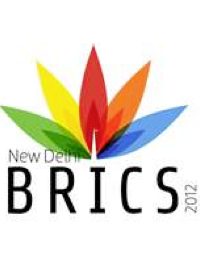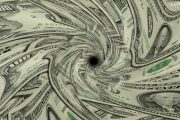
The statist rulers of the so-called “BRICS” countries — Brazil, Russia, India, China, and South Africa — have been subtly calling for an end to the U.S. dollar’s status as the world reserve currency for years. Now, they are making more moves to turn that rhetoric into reality, proposing a jointly controlled “development” bank and working to sideline America’s already-troubled Federal Reserve Notes in trade by relying more heavily on their own fiat currencies.
The overarching theme of this year’s gathering in New Delhi was “BRICS Partnership for Global Stability, Security and Prosperity,” according to a declaration issued after the summit. And despite being filled with fluff, the final statement adopted by leaders of the respective regimes dealt with a wide range of topics. Overall, the five rulers called for increasing centralization of power at the international level on almost every issue.
Among the most important topics were discussions on currencies and reform of the international monetary system and the global financial regime. The five rulers called for an “improved international monetary and financial architecture,” as well as “the establishment and improvement of a just international monetary system.”
While the widely touted BRICS bank failed to materialize at the 2012 meeting, the final declaration noted that the nations’ “Finance Ministers” had been tasked to study the possibility and report back before next year’s summit. But significant progress was made on expanding the role of the nations’ own currencies in intra-BRICS trade.
“We welcome the conclusion of the Master Agreement on Extending Credit Facility in Local Currency under BRICS Interbank Cooperation Mechanism and the Multilateral Letter of Credit Confirmation Facility Agreement,” the declaration explained. As The New American reported last year, increasing the role of their own currencies — at the expense of the U.S. dollar — has been at the top of the coalition’s agenda almost from the beginning.
"The agreements signed today by development banks of BRICS countries will boost trade by offering credit in our local currency," Indian Prime Minister Manmohan Singh noted after the summit. "A suggestion has been made to set up a BRICS development bank, we have directed our [Finance Ministers] to examine the proposal and report back by next summit."
Analysts had varying views on the significance of the move. Some experts claimed it was yet another nail in the dollar’s coffin, while others downplayed its importance. But the globe did take notice.
"The world needs to … find a way to get out from under the dollar as the reserve currency," EuroPacific Capital chief Peter Schiff explained during an interview with Russian broadcaster RT, noting that the value of America’s fiat currency was declining and that the devaluation impacts the reserves held by all BRICS governments. He also said the announcement was a “step” toward ending the dollar’s reign.
In the final summit declaration, the rulers blasted central bankers in advanced countries for flooding the world economy with more debt and currency. They said the aggressive monetary actions had spilled into emerging economies while creating volatility in capital flows and commodity prices.
“The immediate priority at hand is to restore market confidence and get global growth back on track,” the statement said, calling for the adoption of “responsible” policies by rich governments and for more centralization of coercive power at the global level. “We will work with the international community to ensure international policy coordination to maintain macroeconomic stability conducive to the healthy recovery of the global economy.”
Centralizing power at the international level across virtually every field was a central issue for BRICS rulers. According to the declaration, for example, the United Nations “has a central role in coordinating international action against terrorism.” And more broadly, the global body must play “a central role in dealing with global challenges and threats.”
The final agreement touted the as-yet undefined “Green Economy,” which according to UN bosses will be used to further centralize power, and the highly controversial notion of “sustainable development.” The BRICS also called on the “international community” to renew its commitment to “Agenda 21” — a global scheme to centrally plan most human activity and end private control of property — at the upcoming UN “sustainability” summit in Rio.
Finally, the five leaders demanded more money. The declaration called on the World Bank, for instance, to funnel more “development” resources to regimes ruling poorer nations. It also claimed taxpayers in developed countries should “provide enhanced financial, technology and capacity building support” to the regimes ruling poorer nations — supposedly to fight “climate change.”
Together, the five BRICS regimes control almost half of the world’s population and about one fifth of global GDP. Spread across four continents, however, the nations do not have much in common other than poverty and socialist or communist-leaning rulers.
Trade among the five countries amounts to a measly $230 billion per year, according to a report in the Financial Express. By comparison, the value of trade between just the U.S. and China last year was over $500 billion.
Despite their problems, however, all of the BRICS nations are viewed by analysts as “emerging” economic powers. The International Monetary Fund even expects the Chinese economy to surpass America’s in size within the next four to five years.
As such, the five rulers emphasized on multiple occasions that their regimes should be better represented in the decision-making of global bodies. “Strengthened representation of emerging and developing countries in the institutions of global governance,” the declaration said, would supposedly “enhance their effectiveness" in dealing with “the challenges and the opportunities before the world today.”
Iran and Syria were also on the agenda, with the BRICS rulers calling for dialogue rather than war and violence to resolve the disputes. And Israel was urged to cease unilateral “settlement activity” in the “Occupied Palestinian Territories.”
This year’s summit was heavily criticized for its crackdown on protesters. Hundreds of people were rounded up by Indian authorities — so-called “preventative arrests” — to prevent Tibetan activists from protesting against the presence of Chinese communist tyrant Hu Jintao, whose regime is currently occupying and destroying the ancient nation of Tibet. At least one activist died after setting himself on fire.
Last year, the collection of BRICS governments made similar statements regarding the monetary system, centralization of power, praise for the UN, and more. And while some analysts have minimized the potential significance of the five-member alliance, it is slowly and surely making progress toward closer cooperation in a wide range of fields. The Indian press even celebrated the “audacious” push for a “New Global Order.”
The growing attacks on the dollar have been coming from all directions in recent years, with the UN, the BRICS governments, oil producing nations, and even prominent Western leaders calling for a new international monetary system. And with the dollar under ever-increasing pressure, analysts say its future as the global reserve currency does not look bright.
Related articles:
BRICS Leaders Attack U.S. Dollar
George Soros Touts China as Leader of New World Order
China, Japan Agree to Reduce Reliance on U.S. Dollar
G-8 Summit Reveals Growing Anti-Dollar Global Alliance
Ambitious UN Sustainability Conference in Rio to Avoid Climate Talk
UN Steps Up Attack On Dollar, Calls for World Currency
UN Bosses Secretly Plot Global Govt Through “Green Economy" for Rio+20
Corruption: Brazil Sheltering Wanted Marxist Terrorist
IMF: Chinese Economy To Surpass U.S. By 2016
Facing Sanctions, Iran to Sideline Dollar by Using Gold in Trade



